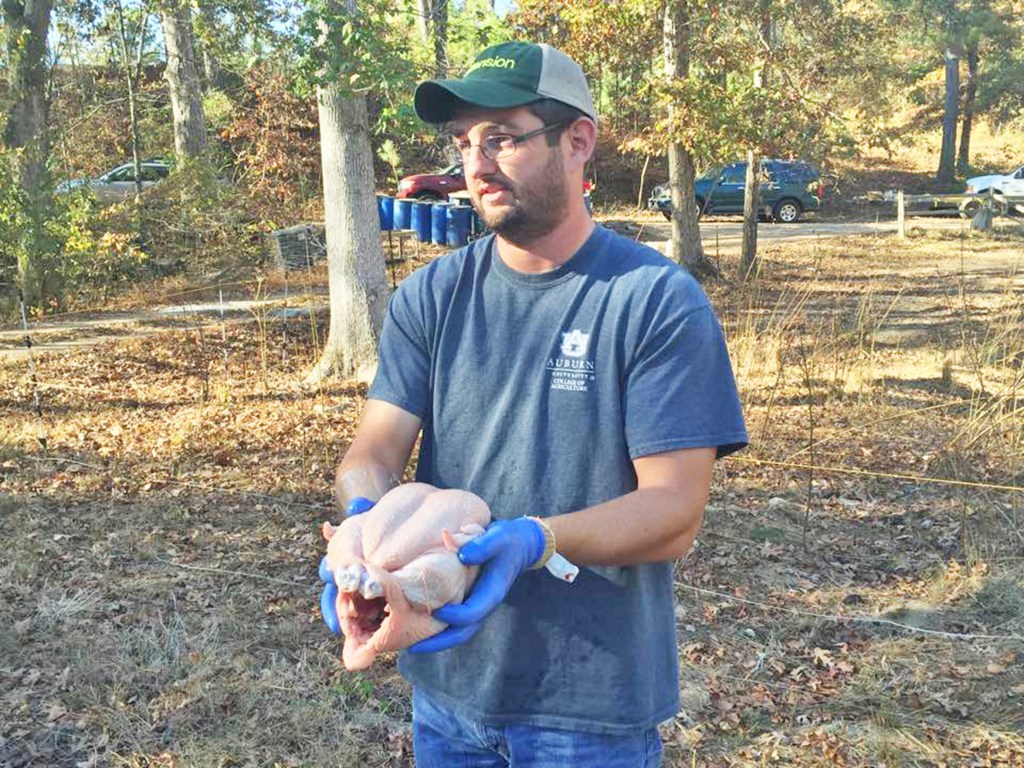THE GARDEN SPOT: A look at popular food fables
Published 12:13 pm Wednesday, September 27, 2017

- Regional Extension Agent Alex Tigue holds a broiler in this undated file photo. A common misconception is that chickens are pumped full of hormones to make them grow larger. Added hormones, beyond the naturally occurring hormones in their bodies, are not needed to allow broilers to meet their genetic potential to produce meat.
In the United States, we are blessed to have the safest and most abundant food supply in the world, hands down. We are blessed to the point we can complain about the food supply.
Over the next few weeks, the Garden Spot will focus on what we like to call food fables.
As consumers, we should educate ourselves so we can make better decisions concerning our food purchases. This week, we will discuss some of the myths associated with poultry and how poultry is raised.
Myth No. 1: Chickens are pumped full of artificial hormones to make them grow larger faster.
There are a couple of issues with the hormone-free chicken label. Broilers (meat birds) have been selected through standard breeding programs (mating birds with improved meat yield and quality with other birds showing important trait improvements such as better health) to eat and digest feed more efficiently, which improves meat.
Added hormones, beyond the naturally occurring hormones in their bodies, are not needed to allow broilers to meet their genetic potential to produce meat. Additionally, if growers were to use added hormones, chickens would need to be injected daily, which is in no way is feasible or economical with more than 20,000 birds per chicken house.
The idea of any hormone-free meat is nearly impossible because all living things create hormones. According to Dr. Joe Hess, extension specialist and professor of poultry science, “Meat comes from an animal, therefore it will have trace levels of various hormones. However, hormone levels found in meat are negligible and will not affect our health. The foods we eat, particularly hormone-based proteins, are broken down in our stomachs and intestines into base amino acids. This removes any possible effects that might be attributed to the minuscule levels of hormones in meat.”
Even if the use of hormones in poultry production was effective and economical, it is not legal. Hormone use in poultry production was banned in the 1950s.
Myth No. 2: Free-range or pasture-raised animals live healthier lives than their factory farmed counterparts.
Free-range poultry is grown outside, meaning they are not confined to a large conventional poultry house. But, they are typically raised in open-air pens with the same amount of space as a conventional poultry house. Free-range animals are typically fed the same grain-based ration but are also able to forage in the environment.
Because these animals are exposed to the environment, they typically have a higher mortality rate compared to conventional production due to predators and environmental stresses. Free-range animals are also exposed to diseases more easily than conventional animals, while their conventionally raised counterparts live out their days in a climate-controlled facility, protected from the elements and predation.
Myth No. 3: Only purchase organic chicken so it doesn’t contain antibiotics.
It is true that in conventionally raised meat, antibiotics are used in four situations:
• Disease treatment for animals after they are clinically ill;
• Disease control to reduce the spread of a specific disease after an animal has been infected;
• Disease prevention to prevent disease among animals susceptible to infections; and
• Nutritional efficiency to promote overall well-being.
When antibiotics are used, the Food and Drug Administration mandates withdrawal times to help prevent antibiotics from entering the food chain. With antibiotic resistance being an increasingly worrisome issue, the FDA has now mandated that all medically important antibiotics fed to animals must have a prescription from a veterinarian for the disease it is treating, and no antibiotics can legally be fed for the sole purpose of increasing animal growth and performance.
The U.S. has one of the most regulated food systems in the world. Milk and meat from treated animals must be tested multiple times to ensure no residue is present when these food products enter the market.
Hopefully, by writing this article, we were able to dispel some of the misinformation regarding our food supply and help consumers make wiser decisions related to food based on FACTS not fear.
— Tigue is the regional extension agent for animal sciences and forages in east-central Alabama. For information on topics related to the home and garden, contact any office of the Alabama Cooperative Extension System. The Limestone County Office is located at 1109 W. Market St. in Athens. Office hours are 8 a.m.-4:30 p.m. Mondays through Fridays. For more information, call 256-232-5510 or visit www.aces.edu.





